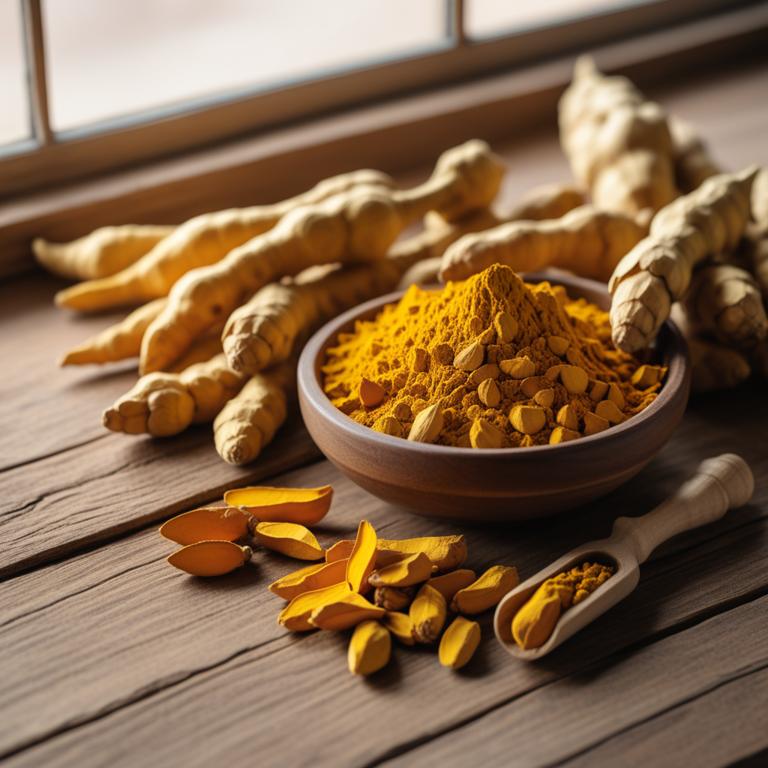Updated: Dec 1, 2024
Overcoming Numbness in Hands with Medicinal Herbs and Herbal Preparations

Numbness in hands can be a frustrating and debilitating condition that affects your daily life.
It can cause you to drop things, struggle with simple tasks, and even lead to pain and discomfort. So, what causes this numbness?. It can be due to a variety of factors, such as nerve damage, diabetes, or even repetitive strain injuries from overusing your hands. Fortunately, there are some natural remedies that can help alleviate numbness in hands.
Certain herbs, such as ginger and turmeric, have anti-inflammatory properties that can help reduce swelling and pain. The roots of the ashwagandha plant have been shown to improve nerve function and reduce numbness, while the leaves of the ginkgo biloba plant can help improve blood flow to the hands. To use these herbs, you can try making teas by steeping the roots or leaves in hot water. You can also take them in capsule form or apply topical creams to the affected areas. Another option is to try ginger and turmeric in food form, such as adding fresh ginger to your meals or taking turmeric capsules.
By incorporating these herbal remedies into your daily routine, you may find relief from numbness in your hands and be able to perform daily tasks with ease.
Table of Contents
- What factors contribute to numbness in hands?
- What are the advantages of using herbs for treating numbness in hands?
- What are the main medicinal herbs used to treat numbness in hands condition?
- What herbal preparations are most commonly used to alleviate numbness in hands?
- Which herbs should you be cautious of if you have numbness in hands?
- FAQ
What factors contribute to numbness in hands?
The main causes of numbness in hands are varied and often related to nerve damage or compression.
One common cause is diabetes, a condition where high blood sugar levels damage nerves over time, leading to numbness, tingling, and pain in the hands. Multiple Sclerosis, an autoimmune disease, also causes numbness in hands due to the body's immune system attacking the protective covering of nerve fibers, disrupting communication between the brain and the rest of the body. Carpal tunnel syndrome, a condition where the median nerve in the wrist is compressed, is another common cause of numbness in hands.
When the nerve is squeezed, it can cause numbness, tingling, and weakness in the hands, especially in the thumb, index, and middle fingers. A pinched nerve, where a nerve is compressed or irritated by surrounding tissues or bones, can also cause numbness in hands, often due to poor posture, injury, or overuse. Herniated disk, a condition where a disk in the spine bulges and puts pressure on nearby nerves, can also cause numbness in hands. When the nerves are compressed, they can send mixed signals to the brain, leading to numbness, tingling, and pain in the hands.
Radial nerve damage, which can occur due to injury, compression, or disease, can also cause numbness in hands, often affecting the back of the hand and fingers.
What are the advantages of using herbs for treating numbness in hands?
Using herbs for numbness in hands can provide several benefits.
One of the main advantages is that they are natural and gentle on the body, making them a great alternative to harsh chemicals and medications. These herbs can help to improve blood circulation and reduce inflammation in the affected areas, which can help to alleviate numbness and tingling sensations.
Additionally, they have anti-oxidant properties that can help to protect the nerves and reduce damage caused by free radicals. They can also help to relax the muscles and calm the nervous system, which can help to reduce stress and anxiety that can contribute to numbness. Furthermore, many of these herbs are easy to find and can be incorporated into your daily routine through teas, ointments, or essential oils.
By using these herbs, you can take a proactive approach to managing numbness in your hands and improving your overall well-being.
What are the main medicinal herbs used to treat numbness in hands condition?

Herbs like Zingiber officinale (Ginger) and Curcuma longa (Turmeric) have anti-inflammatory properties that can help reduce numbness in hands.
They contain compounds that block the production of pain-causing chemicals in the body. This can provide relief from numbness caused by inflammation or injury. Ginkgo biloba is known for its ability to improve blood flow. When blood flow to the hands is poor, numbness can occur. Ginkgo biloba can help increase blood flow to the hands, reducing numbness and improving circulation.
Capsicum annuum (Cayenne pepper) contains a compound called capsaicin, which can help block pain signals to the brain. By reducing pain signals, capsaicin can help alleviate numbness in the hands. Piper nigrum (Black pepper) contains a compound called piperine, which has anti-inflammatory properties. Like Zingiber officinale and Curcuma longa, piperine can help reduce inflammation and alleviate numbness in the hands. These herbs can be consumed in various forms, such as teas, capsules, or added to food.
However, it's essential to consult a healthcare professional before using any herbal remedy, especially if you have underlying health conditions or are taking medication.
What herbal preparations are most commonly used to alleviate numbness in hands?

Herbal preparations can be a great way to help with numbness in your hands.
One option is a tincture, a liquid extract of herbs that you take by mouth. Tinctures can be made from herbs like cayenne pepper, which helps increase blood flow to numb areas, or ginger, which has anti-inflammatory properties that can help reduce numbness. Another option is a salve, a topical ointment that you apply directly to the affected area. Salves can be made with herbs like arnica, which reduces swelling and promotes healing, or St. John's Wort, which can help with nerve pain. A decoction is a strong tea made by boiling herbs in water. You can drink decoctions to help with numbness in your hands.
Herbs like turmeric and ginkgo biloba are commonly used for this purpose because they have anti-inflammatory and antioxidant properties that can help reduce numbness. Suppositories are another option, where you insert a small amount of herbal preparation into your body through your rectum. This can be helpful for numbness in the hands caused by nerve damage or inflammation. Herbs like capsaicin and lobelia can be used in suppositories to help increase blood flow and reduce numbness. Lastly, you can also take herbal preparations in capsule form. Capsules are made with a powdered herb that you swallow with water.
Herbs like cayenne pepper and ginkgo biloba are commonly used in capsules to help increase blood flow and reduce numbness in the hands.
Additional Resources:
Which herbs should you be cautious of if you have numbness in hands?
If you're experiencing numbness in your hands, it's best to avoid certain herbs that can make the problem worse.
Taxus baccata, also known as the yew tree, contains a toxic substance called taxine that can cause numbness, tingling, and even paralysis in your hands and feet. Datura stramonium, or the jimsonweed, contains scopolamine, a powerful toxin that can disrupt the nervous system and lead to numbness, muscle weakness, and other problems.
Veratrum album, or the white hellebore, contains veratridine, a toxic compound that can cause numbness, muscle cramps, and respiratory failure. Hyoscyamus niger, or the black henbane, contains scopolamine and hyoscyamine, which can also disrupt the nervous system and cause numbness, confusion, and other issues. Aconitum carmichaelii, or the monk's hood, contains aconitine, a toxic alkaloid that can cause numbness, tingling, and muscle weakness in your hands and feet.
These herbs can be toxic and interact with other medications, so if you have numbness in your hands, it's best to avoid them and consult with a healthcare professional for proper advice.
FAQ
Are there any specific herbs that can prevent numbness in hands?
Ginger is known to improve blood flow, which can help prevent numbness in hands.
It also has anti-inflammatory properties that can reduce swelling in the hands and wrists. Turmeric, another herb with anti-inflammatory properties, can also help reduce numbness and pain in the hands.
These herbs can be consumed as tea or added to meals.
Is it safe to use herbal remedies for numbness in hands during pregnancy?
It's generally not recommended to use herbal remedies for numbness in hands during pregnancy.
Some herbs can cause blood pressure to drop or interact with other medications, which can be a concern during pregnancy.
If you're experiencing numbness, talk to your healthcare provider about safe and effective treatment options.
Are there any herbs that can reduce the frequency of numbness in hands?
Ginger has been studied for its potential to reduce numbness in hands.
It's believed to improve blood flow and reduce inflammation, which may help alleviate numbness.
Some people also use turmeric, which contains a compound called curcumin that has anti-inflammatory properties, to help manage numbness in their hands.
Related Articles

Migraine: Understanding the Causes and Herbal Remedies

Motion Sickness Causes and Medicinal Herbs for Relief

Brain Fog: A Guide to Causes, Medicinal Herbs, and Natural Preparations

Earache Treatment with Natural Medicinal Herbs and Herbal Remedies

Dry Mouth Remedies: Causes and Natural Treatments






